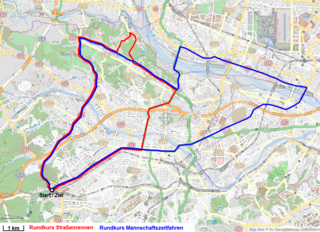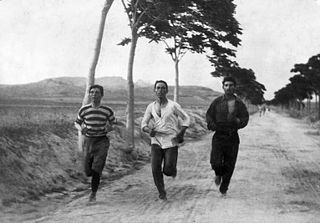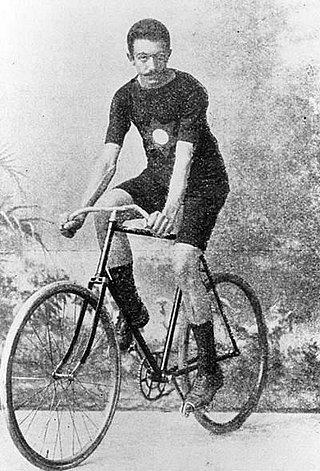
The 1896 Summer Olympics, officially known as the Games of the I Olympiad and commonly known as Athens 1896, was the first international Olympic Games held in modern history. Organised by the International Olympic Committee (IOC), which had been created by French aristocrat Pierre de Coubertin, it was held in Athens, Greece, from 6 to 15 April 1896.

At the 1896 Summer Olympics, the first modern Olympiad, twelve athletics events were contested. A total of 25 medals were awarded. The medals were later denoted as 37 modern medals. All of the events except the marathon were held in the Panathinaiko Stadium, which was also the finish for the marathon. Events were held on 6 April, 7 April, 9 April, and 10 April 1896. Altogether, 63 athletes, all men, from nine nations competed. This made athletics the most international of the nine sports at the 1896 Games.

The men's individual road race was a cycling event at the 2004 Summer Olympics. It was held on 14 August 2004. There were 144 competitors from 43 nations. The maximum number of cyclists per nation had been set at five since professionals were allowed in 1996. The event was won by Paolo Bettini of Italy, the nation's first victory in the men's individual road race since 1992 and fifth overall. Sérgio Paulinho's silver was Portugal's first medal in the event. Belgium earned its first medal in the men's road race since 1964 with Axel Merckx's bronze.

Road bicycle racing is the cycle sport discipline of road cycling, held primarily on paved roads. Road racing is the most popular professional form of bicycle racing, in terms of numbers of competitors, events and spectators. The two most common competition formats are mass start events, where riders start simultaneously and race to a set finish point; and time trials, where individual riders or teams race a course alone against the clock. Stage races or "tours" take multiple days, and consist of several mass-start or time-trial stages ridden consecutively.
Edward Battell was a British racing cyclist. He competed at the 1896 Summer Olympics in Athens.
Aristidis Konstantinidis was a Greek racing cyclist. He competed at the 1896 Summer Olympics in Athens.

August von Gödrich was a German racing cyclist. He competed at the 1896 Summer Olympics in Athens.

The men's sprint was one of the five track cycling events on the Cycling at the 1896 Summer Olympics programme. It was held on 11 April as the second event on the schedule. It was held over the distance of 2 kilometres, or six laps of the track. The event was won by Paul Masson of France, with his teammate Léon Flameng earning bronze. Stamatios Nikolopoulos of Greece took silver

The men's 10 kilometres was one of the five track cycling races on the Cycling at the 1896 Summer Olympics programme. It was held on 11 April and comprised 30 laps of the track. The 1896 Games was the only time that the 10 kilometres track race was part of the cycling program at an Olympic Games. Six cyclists from four nations competed. The event was won by Paul Masson of France, the second of his three victories that day. His countryman Léon Flameng finished second, while Austrian Adolf Schmal was third.

The men's 100 kilometres was one of five track cycling events on the Cycling at the 1896 Summer Olympics programme. It was the first race held, on 8 April. It required cyclists to complete 300 circuits of the track. Nine cyclists from five nations competed. The event was won by Léon Flameng of France, with Georgios Kolettis of Greece coming in second.

The men's 12 hour race was one of five track cycling events on the Cycling at the 1896 Summer Olympics programme. It was the final event of the 1896 Summer Olympics, ending at 5 p.m. on 13 April. Seven cyclists from four nations started. The event was won by Adolf Schmal of Austria, the only gold medal in cycling ever won by the nation, until Anna Kiesenhofer's win in the 2020 Women's Road Race. Schmal lapped silver medalist Frederick Keeping of Great Britain early, winning by that lap as the two were the only riders to finish. The 12 hour race was the last event to finish at the 1896 Games.

The men's individual road race was a road bicycle racing event held as part of the Cycling at the 1964 Summer Olympics programme. It was held on 22 October 1964. The course, just short of 25 kilometres, was covered 8 times for a total distance of 194.832 kilometres. 132 cyclists from 35 nations competed. The maximum number of cyclists per nation was four. The event was won by Mario Zanin of Italy, the nation's second victory in the men's individual road race and third consecutive Games in the top two. Kjell Rodian earned Denmark's first medal in the event with his silver. Walter Godefroot's bronze was Belgium's fifth medal in five Games.

The men's individual road race at the 1952 Summer Olympics was held on 2 August, the 2nd last day of the Olympics on an 11,2 km course running counter-clockwise from Käpylä through Pakila and Maunula and back to Käpylä. The course was circled seventeen times, so the total length of the competition was 190,4 km. About half of the road was hard-surfaced, the other half sand-surfaced. There were 154 entries from 31 nations and 111 participants from 30 nations. Each nation could enter up to four cyclists; nations entering at least three cyclists had the scores of their best three finishers summed for the team road race event. The individual event was won by André Noyelle of Belgium, the nation's first victory in the men's individual road race. His teammate Robert Grondelaers took silver. Edi Ziegler earned Germany's first medal in the event since 1896 with his bronze.

The men's individual road race at the 1996 Summer Olympics in Atlanta, was held on July 31, 1996. There were 183 participants from 57 nations in the race over 221.85 km, with 116 cyclists finishing. For the first time, the event was open to professionals. The maximum number of cyclists per nation was five, up from three in previous editions of the event. The event was won by Pascal Richard of Switzerland, the nation's first victory in the men's individual road race and first medal in the event since a bronze in 1936. Rolf Sørensen earned Denmark's third medal in the event, silver just as in 1964 and 1968. Max Sciandri similarly matched Great Britain's best result: a bronze, as in 1896 and 1956.

The men's individual road race was an event at the 1980 Summer Olympics in Moscow. 115 cyclists from 32 nations took part. The maximum number of cyclists per nation was four. The event was won by Sergei Sukhoruchenkov of the Soviet Union, the nation's second victory in the men's individual road race. His teammate Yuri Barinov took bronze. Czesław Lang's silver put Poland on the podium in the event for the second straight Games.
The cycling competitions of the 2020 Summer Olympics in Tokyo featured 22 events in five disciplines. The 2020 Olympics were postponed to 2021 due to the COVID-19 pandemic.

The marathon at the Summer Olympics is the only road running event held at the multi-sport event. The men's marathon has been present on the Olympic athletics programme since 1896. Nearly ninety years later, the women's event was added to the programme at the 1984 Olympics in Los Angeles.

The men's individual road race cycling event at the 1936 Summer Olympics took place on 10 August over 100 km. Ninety-nine cyclists from 28 nations competed. This was the first time that the cycling road race was conducted as a mass start event since 1896 and was one of six cycling events at the 1936 Olympics. The men's team road race was held in conjunction with this event, with teams having four riders and the team time taken as sum of the team's three best finishers. The individual event was won by Robert Charpentier of France, with his teammate Guy Lapébie in second. Ernst Nievergelt of Switzerland took bronze. They were the first men's mass-start road race medals for both nations, which had not competed in 1896.

The men's individual road race was a road bicycle racing event held as part of the Cycling at the 1968 Summer Olympics programme. 144 cyclists from 44 nations took part. The maximum number of cyclists per nation was four. It was held on 23 October 1968. The course, just short of 25 kilometres, was covered 8 times for a total distance of 196.2 kilometres. The event was won by Pierfranco Vianelli of Italy, the nation's second consecutive victory in the men's individual road race. It was the fourth consecutive Games that an Italian cyclist finished first or second. Leif Mortensen's silver was Denmark's second consecutive silver medal in the event. Gösta Pettersson earned Sweden's first medal in the event with his bronze.

The road race is one of two road bicycle racing events held at the Summer Olympics, the other being the time trial. The road race is a mass start, distinguished from the separate starts of the time trial. The men's road race was first held at the 1896, was not held again for 40 years, then has been held every Summer Games since the 1936 Summer Olympics. The women's event was first contested at the 1984 Summer Olympics, being the first women's cycling event.















